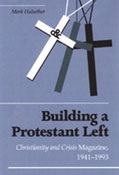
In Building a Protestant Left, Mark Hulsether uses the history of C&C as a case study to explore changing ideas about religion and society in the latter half of the twentieth century. He follows the twists and turns of this story from Niebuhr's Christian realist positions of the 1940s, through Protestant participation in the complex social movements of the 1950s and 1960s, to the emergence of various liberation theologies—African American, feminist, Latin American, and others—that used C&C as a central arena of debate in the 1970s and 1980s. Throughout, Hulsether places these changes in the context of postwar cultural and social history, relating C&C's theological and ethical positions to the broader social and political issues the journal addressed. Included, for example, is an illuminating discussion of C&C's positions in relation to one of the major developments of recent decades: the rise of neoconservatism and the religious right.
Engagingly written, Building a Protestant Left bridges the gap between secularized history and cultural studies on the one hand and traditional religious studies and religious ethics on the other. It also bridges an important generational gap within public-minded religious thought—it is as well informed on the issues that engaged the magazine during Niebuhr's heyday (from the 1940 to the 1960s) as on the liberation theologies and other radical positions that came afterward.
The Author: Mark Hulsether is assistant professor of religious studies and American studies at the University of Tennessee, Knoxville.
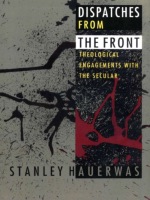
At once Christian theology and social criticism, this book aims to show that the two cannot be separated. In this spirit, Hauerwas mounts a forceful attack on current sentimentalities about the significance of democracy, the importance of the family, and compassion, which appears here as a literally fatal virtue. In this time of the decline of religious knowledge, when knowing a little about a religion tends to do more harm than good, Hauerwas offers direction to those who would make Christian discourse both useful and truthful. Animated by a deep commitment, his essays exhibit the difference that Christian theology can make in the shaping of lives and the world.
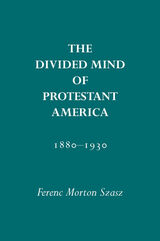
The Divided Mind of Protestant America is a documented overview of American Protestantism in American culture from beginning to end. It discusses liberal-fundamentalist tensions in America and the role of mainline Protestantism, evangelicalism, and fundamentalism in American culture.
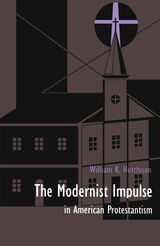

One of the nation's foremost authorities on American religion here traces the immensely important strand of liberal thought in American Protestantism during the last century. From a refreshingly candid viewpoint that religious ideas operate with some autonomy and religious thought is only partially reducible to social experience--or explained by it, William R. Hutchison has produced an original, lasting work that will appeal to readers interested in the formation of American culture and in the shaping role played by religion.
Modernism, the author demonstrates, was a carefully wrought theological affirmation of those "generous hopes for the world's destiny" (Hawthorne's phrase) that energized nineteenth- and early twentieth-century reform. Although the modern religious impulse has been widely and correctly remembered as having called for the adjustment of religious ideas and practices to the demands of science and contemporary thought, more profound ideas gave the trend its force and integrity. Particularly, modernism formulated positive theological convictions about the presence and action of God in cultural development.
Combining judiciousness with a finely wrought style, Hutchison depicts the uncertain development of liberalism before 1875 in Unitarianism, in Congregationalism, in the concepts of individual regeneration preached by Horace Bushnell, and in the New School Presbyterianism of Chicago. The liberals' determination to preserve the special claims of Christianity in the face of doubts raised by Darwinism and the Higher Criticism is fully discussed, as is the evolution of forms of theism that found God revealed in many places besides Holy Writ. The social crises of the early twentieth century, together with developing doubts about human nature and progress, form the backdrop for an evaluation of external and internal criticisms of liberal thought. The Social Gospel and associated movements are skillfully explored. Hutchison also weighs the attacks upon liberal and modernist thought that followed World War I, when fundamentalism and then humanism and Reinhold Niebuhr's neo-orthodoxy protested with increasing stridency against the liberal world view.
The author views modernism as a faith arising from an extraordinary confidence, now largely dissipated, in the coming of an earthly kingdom. But he also believes that the modernist form of thought continues to have powerful effects, particularly in modifying the sense of alienation between religion and culture that historically has been a trait of Western society.
This volume, imbued with the deeply felt vision of a remarkable author, is a model of clarity and a work of great historical importance.
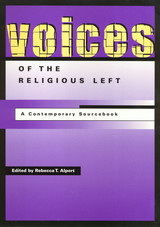
The academics and activists who write this rich volume, edited by Rebecca Alpert, argue passionately on topics that concern all of us. Quoting from the Bible, the Torah, the Qur'an, the teachings of Buddha, as well as Native American folklore, they make the voices of the religious left heard -- teaching lessons of peace and liberation.
As this invaluable sourcebook shows, the religious left is committed to issues of human rights and dignity. Answering questions of identity and ideology, the essays included here stem from the "culture wars" that have divided orthodox and liberal believers. Responding to the needs of and raised by marginalized social groups, the writers discuss economic issues and religious politics as they champion equal rights, and promote the teaching of progressive vision.
Containing insightful perspectives of adherents to many faiths, Voices of the Religious Left makes it clear that there is a group dedicated to instilling the values of justice and freedom. They are far from silent.
All of the essays in this collection "...represent the power of the written word as a vehicle for advocacy and social change....It is my hope that the readers of these essays will themselves feel compelled to think more about the importance of taking a stand on issues from religious perspectives, and to act on something that compels them." --Rabbi Rebecca Alpert
READERS
Browse our collection.
PUBLISHERS
See BiblioVault's publisher services.
STUDENT SERVICES
Files for college accessibility offices.
UChicago Accessibility Resources
home | accessibility | search | about | contact us
BiblioVault ® 2001 - 2024
The University of Chicago Press









